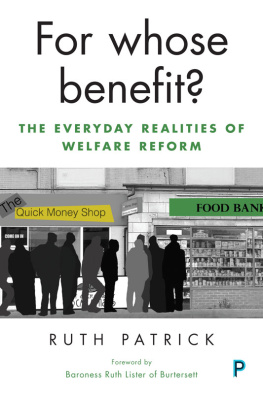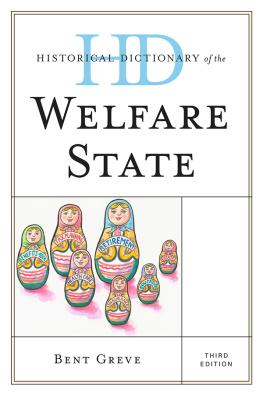SOCIAL AND POLITICAL POWER
Series editor : Mark Haugaard
Power is one of the most fundamental concepts in social science. Yet, despite the undisputed centrality of power to social and political life, few have agreed on exactly what it is or how it manifests itself. Social and Political Power is a book series which provides a forum for this absolutely central, and much debated, social phenomenon. The series is theoretical, in both a social scientific and normative sense, yet also empirical in its orientation. Theoretically it is oriented towards the Anglo-American tradition, including Dahl and Lukes, as well as to the Continental perspectives, influenced either by Foucault and Bourdieu, or by Arendt and the Frankfurt School. Empirically, the series provides an intellectual forum for power research from the disciplines of sociology, political science and the other social sciences, and also for policy-oriented analysis.
Already published
Power, luck and freedom: Collected essays
Keith Dowding
Neoliberal power and public management reforms
Peter Triantafillou
Evaluating parental power: An exercise in pluralist political theory
Allyn Fives
Copyright page
Copyright Nanna Mik-Meyer 2017
The right of Nanna Mik-Meyer to be identified as the author of this work has been asserted by her in accordance with the Copyright, Designs and Patents Act 1988.
Published by Manchester University Press
Altrincham Street, Manchester M1 7JA
www.manchesteruniversitypress.co.uk
British Library Cataloguing-in-Publication Data
A catalogue record for this book is available from the British Library
Library of Congress Cataloging-in-Publication Data applied for
ISBN 978 1 5261 1028 2 hardback
First published 2017
The publisher has no responsibility for the persistence or accuracy of URLs for any external or third-party internet websites referred to in this book, and does not guarantee that any content on such websites is, or will remain, accurate or appropriate.
Bertrand Russell once argued that power is to social science what energy is to physics (Russell 1938: 10). While power is one of the most important concepts in the social sciences, it is also one of the most complex and elusive to research.
Webers analysis of power and authority (). This includes an agency-based, exercise and decision-making definition of power; conceptualized in terms of powerful actors (A) making subordinates (B) do something that they would not otherwise do. This exercise of power is distinct from resources (that may or may not be exercised), and it provides power-holders with power of specific scope. However, while providing a new set of conceptual tools to analyse about power relations, Dahls work was subject to sustained critique from Bachrach and Baratz and others, who argued that power is also exercised through structural biases that are not necessarily reducible to overt decision-making (Bachrach and Baratz 1962). Lukes followed this critique with his theorization of the third dimension of power (Lukes 1974), which concerns the mobilization of belief and ideology to legitimise power relations of domination. The three-dimensional model was applied in a richly textured empirical study of Appalachian mining communities (Gaventa 1982). Overall, as the three-dimensional power debates develop, the focus shifts from actions of the dominating actor A to the counterintuitive and fascinating phenomenon that subordinate actors B often appear to actively acquiesce or participate in their own domination.
In a qualified critique of Lukes, Scott argued that appearances are often deceptive (Scott 1990). The relationship between public and private discourse renders the working of three-dimensional power more complex than any simplistic images of the oppressed willingly participating in their own domination, or internalizing false consciousness. In turn, Scotts work has inspired an ongoing power literature on the complexities of resistance versus acquiescence.
In the 1980s, under the influence of the translation of Foucaults work (e.g., ), the Anglophone power debates shifted towards more epistemic and ontological analysis, which resonated with the shift of emphasis from the powerful to the conditions of the oppressed. This gave rise to fascinating work on the relation between power and discourse, power and truth, the way power influences the ontological formation of social subjects through discipline and how governmentality has changed systemic power relations (including Clegg 1989; Flyvbjerg 1998; Hayward 2000; Laclau 2005; Dean 2010). However, in critique, many have argued that neo-Foucauldians tend to lose sight of the significance of individual agency (Lukes 2005).
Bridging the intellectual divide between those following the DahlLukes trajectory and the neo-Foucauldians, another important thread to the power debates comes from ) conceptualizations of structure as a verb. This way of thinking provides us with conceptual tools for making sense of how agents both structure and are structured by relations of power.
In international relations, the shift from agency towards systemic, epistemic and ontological perceptions of power took the form of a gradual move from a realist focus on resources to a more idealist emphasis upon soft power (). Similarly, in rational choice theory, there emerged an emphasis upon the systemic situatedness of strategic choices (Dowding 2016).
The effect of interrogating the social contexts and social ontology of agents has caused many theorists to re-evaluate the nature of power normatively, moving away from the automatic equation between power and domination to a perception of power as a condition of possibility for agency, and thus freedom (; Pansardi 2012). To begin with, power-over was considered a normative negative, suggesting oppression, while power-to and power-with were the positives. However, some theorists argue power-over can also have emancipatory, as well as the more obvious dominating, aspects (Haugaard 2012).
Within these theoretical contexts, Nanna Mik-Meyers book, The power of citizens and professionals in welfare encounters: The influence of bureaucracy, market and psychology , constitutes an ethnographically rich account of the microphysics of power relations between staff and citizens in welfare organizations. The described encounters take place in bureaucratic contexts, which suggest Weberian theories of bureaucratic authority, coupled with one-dimensional, top-down, exercises of power. Alternatively, drawing upon Foucault and Bourdieu, the reader might expect experts versus disempowered citizens, and clear boundaries of what counts as relevant truth and epistemic knowledge. However, as the books analyses show, these professionals do not establish themselves as the undisputed holders of expertise or power-over. The citizens emerge with significant authoritative power derived from their everyday knowledge of their own experiences, and of influential systems of thought. Thus, professionals do not have a monopoly of truth. Furthermore, it is often contested which realms of knowledge are considered valid sources of epistemic cultural capital. Rather than one episteme, Mik-Meyer shows contested knowledge that includes bureaucratic criteria (as one might expect), popular psychology, market values and the everyday life of the citizen, all of which pull in different directions. This is a brilliant example of how well-grounded empirical research often confounds, or makes more complex, our theoretical models of power relations.









